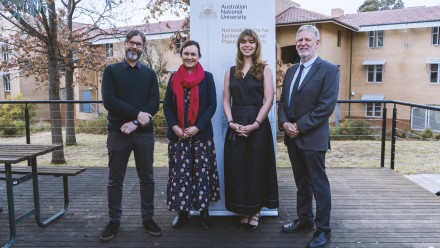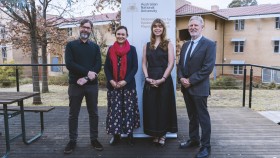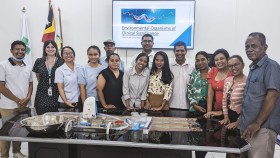November report for Epidemiology for Policy and Practice
Share
Good News
Alice Morgan and family welcomed their new baby Lara Diana Morgan on 17/9/2020
Outreach and engagement
Ray Lovett was part of the CI team that recently won a NHMRC CRE (2.5 million) through the University of Queensland: ‘Centre for Research Excellence on Achieving the Tobacco Endgame’
The Mayi Kuwayu Study was asked to provide a proposal to the Department of Health on compiling data for reporting on the cultural determinants of health as part of the new national Aboriginal and Torres Strait Islander Health Implementation.
Jason Agostino is a member of the Health Services Data Advisory Group that is reviewing national key performance indicators. This group is looking at how to improve indicators, including those related to CVD risk. He is also part of the Royal Australian College of General Practitioners reference group for health assessments; their current focus is on adapting health assessments for telehealth consulting to ensure that preventive health activities and follow-up continue in the context of COVID.
Ellie Paige and Jason Agostino taught into a short course for staff at the Health and Medical Research Office, Department of Health.
Jason Agostino, Deb Wong and Andreas Timothy lead a combined investigator meeting held on 14 October to conclude the Absolute CVD risk program of work and commence the Enhanced Chronic Disease Screening for Aboriginal and Torres Strait Islander peoples program of work. Investigators reviewed the successes and challenges of the closing program of work and discussed approaches to the new program of work.
Student news
Alison Wijnen submitted her Honours thesis titled ‘Observed and Predicted Premature Mortality in Australia due to Non-communicable Diseases: Progress towards the WHO 25X25 goal.
Papers accepted/published:
Maddox, R., Thurber, K.A., Calma, T., Banks, E. and Lovett, R. (2020), Deadly news: the downward trend continues in Aboriginal and Torres Strait Islander smoking 2004–2019. Australian and New Zealand Journal of Public Health. doi:10.1111/1753-6405.13049
Falster K, Hanly M, Edwards B, Banks E, Lynch J, Eades S, Nickel N, Goldfield S, Biddle N. Preschool attendance and developmental outcomes at age five in Indigenous and non-Indigenous children: a population-based cohort study of 100,357 Australian children. J Epidemiol Community Health (accepted 15 Oct 2020).
Joshy G, Thandrayen J, Koczwara B, Butow P, Laidsaar-Powell R, Rankin N, Canfell K, Stubbs J, Grogan P, Bailey L, Yazidjoglou A, Banks E. Disability, psychological distress and quality of life in relation to cancer diagnosis and cancer type: population-based Australian study of 22,205 cancer survivors and 244,000 people without cancer. BMC Medicine (accepted 28 October 2020).
Heris C, Thurber K, Wright D, Thomas D, Chamerlain C, Gubhaju L, Sherriff S, McNamara B, Banks E, Smith N, Eades S. Staying smoke-free: factors associated with non-smoking among urban Aboriginal adolescents in the Study of Environment on Aboriginal Resilience and Child Health (SEARCH). Aust J Health Promotion 2020; Oct 9. doi: 10.1002/hpja.430 (Epub ahead of print).
Progress on research projects
The CVD Implementation team continues to engage with:
- NPS MedicineWise, reviewing education modules for health workers on hypertension and diabetes medication.
- The National Heart Foundation regarding:
- Update of the absolute CVD risk assessment algorithm and guidelines for Aboriginal and Torres Strait Islander peoples
- Inclusion of the Healthy Heart: Communities CVD Risk Education Toolkit in forthcoming Heart Foundation educational resources
- Updates to the Heart Foundation website to reflect the recently released Consensus statement on CVD risk assessment for Aboriginal and Torres Strait Islander adults under 35 years and links to the Healthy Heart: Communities toolkit https://www.heartfoundation.org.au/conditions/fp-absolute-cvd-risk-clinical-guidelines-(1)
The Humanitarian Health Research Initiative team has completed a project on co-developing tools for Allied Health Services to support them in their role to provide their services to the community during the COVID-19 pandemic. The tools are checklists that serve as a general guideline that practices and practitioners can use to minimise COVID-19 transmission risks. These tools are living documents and can be adapted for the varying COVID-19 situations. They were co-developed and tested with a local Canberra practice and is still undergoing consultation with the Australian Department of Health. You can find these tools and our factsheet about the project and findings on the RSPH Tools and Resources page at: https://rsph.anu.edu.au/research/tools-resources/minimising-covid-19-transmission-risks-checklist-allied-health-practices.
On 8 October 2020, Ben O'Neill and Neal Fultz released an updated version of their R package stat.extend. The newest version of the package includes some additional functions, plus a newly developed algorithm to compute the Highest Density Region (HDR) of an arbitrary discrete distribution. The theory and implementation for this algorithm was developed over the last few months by Ben O'Neill, and he has submitted a paper at Computational Statistics to describe the algorithm and prove it works. To our knowledge, this is the first algorithm that accurately computes a HDR for an arbitrary discrete distribution with no known shape properties (existing algorithms work for some classes of discrete distributions but sometimes miss elements that should be included in the HDR).










